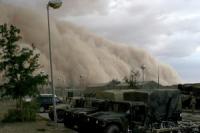-
DARPA tests advanced chemical sensors

DARPA’s SIGMA program, which began in 2014, has demonstrated a city-scale capability for detecting radiological and nuclear threats that is now being operationally deployed. DARPA is building off this work with the SIGMA+ initiative that is focused on providing city- to region-scale detection capabilities across the full chemical, biological, radiological, nuclear, and explosive threat space.
-
-
China raises threat of rare-Earths cutoff to U.S.
With a simple visit to an obscure factory on Monday, Chinese President Xi Jinping has raised the specter that China could potentially cut off supplies of critical materials needed by huge swaths of the U.S. economy, underscoring growing concerns that large-scale economic integration is boomeranging and becoming a geopolitical weapon. Keith Johnson and Elias Groll write in Foreign Policy that Beijing could slam every corner of the American economy, from oil refineries to wind turbines to jet engines, by banning exports of crucial minerals.
-
-
The forensic unknowns of 3D-printed guns
Proponents of the printed guns – 3D-printed with polymers from digital files – maintain that sharing blueprints and printing the guns are protected activities under the First and Second Amendments. Opponents argue the guns are concerning because they are undetectable and also untraceable since they have no serial numbers.
-
-
Profitable climate change solution
A seemingly counterintuitive approach – converting one greenhouse gas into another – holds promise for returning the atmosphere to pre-industrial concentrations of methane, a powerful driver of global warming.
-
-
Be afraid of the world, be very afraid
Who’s right: Cassandra or Dr. Pangloss? Are we on the brink of serious trouble, as Cassandra of Greek myth prophesied, or is all for the best “in this best of all possible worlds,” as the fictional Pangloss insisted in Voltaire’s Candide? “I’m generally a fairly upbeat guy, despite my realist proclivities and my recurring frustrations at the embarrassing state of U.S. foreign policy,” Stephen M. Walt writes in Foreign Policy. “But today I’m going to indulge my inner Cassandra and describe the five bad things that worry me today. I hope I’m wrong.”
-
-
Cities can save lives, resources by using a vulnerability reduction scorecard
A new planning tool enables communities to effectively reduce their vulnerabilities to hazards across their network of plans – including transportation, parks, economic development, hazard mitigation, emergency management and comprehensive land use.
-
-
The costs of extreme weather

An expert tells lawmakers that there is one “underappreciated” fact in discussions about the costs of climate change: “small shifts in long-term average conditions — what we call climate — can have a large effect on the frequency of extreme weather events.” Examples: “In 2017, Hurricane Harvey caused an estimated $125 billion in losses, with an estimated 200,000 homes experiencing damage. Ongoing flooding in the upper Midwest is sure to produce agricultural losses alone in the billions of dollars, and extreme drought across much of the U.S. in 2012 caused $33 billion in losses.”
-
-
Dutch aquifers bank rainwater to help farmers keep the water running

Climate change is increasing the risk of water shortages across Europe, but researchers in the Netherlands are hoping to ease pressure by generating a steady supply of clean water and heat from deep underground reservoirs known as aquifers.
-
-
Wandering Earth: rocket scientist explains how we could move our planet
In the Chinese science fiction film “The Wandering Earth,” recently released on Netflix, humanity attempts to change the Earth’s orbit using enormous thrusters in order to escape the expanding sun – and prevent a collision with Jupiter. The scenario may one day come true. How could we go about it and what are the engineering challenges?
-
-
Will the next cyberattack be in the hospital?
You may not think of hackers targeting hospitals, but this is where our wired world may be most vulnerable, and the results could be deadly. Israeli startup Cynerio aims to stop hackers from targeting medical devices, a potent new danger in our connected world.
-
-
Locating a shooter from the first shot using cellphone
In the past several decades, militaries have worked hard to develop technologies that simultaneously protect infantry soldiers’ hearing and aid in battlefield communication. Now a French researcher has developed a proof of concept that uses the microphones in a TCAPS system to capture a shooter’s acoustic information and transmit this to a soldier’s smartphone to display shooter location in real time.
-
-
The fundamental challenges of living with wildfire
Wildfires can have dramatic impacts on Western landscapes and communities, but human values determine whether the changes caused by fire are desired or dreaded. This is the simple - but often overlooked - message from a collaborative team of researchers.
-
-
Floods will cost the U.K. billions, but AI can help make sewers the first defense
The U.K. will need to spend £1 billion a year on flood management to avoid the worst consequences of climate change, according to the national Environment Agency. Coastal defenses – including sea walls, buffer areas and evacuation plans – can help to protect towns and cities against flooding from storm surges. But inland flooding caused by excess rainwater requires more nuanced solutions. Today, artificial intelligence (AI) can use data to help make decisions about how water should flow in and around human settlements, to avoid the worst effects of flooding.
-
-
As floods increase, cities like Detroit are looking to green stormwater infrastructure
Urban sprawl meant paving over grasslands and wetlands, making it so water is unable to soak into the ground. Today, that impervious development, coupled with the more intense storms brought by climate change, is making flooding a major issue for many cities. Urban areas are looking for better ways to manage runoff.
-
-
Carbon dioxide levels in the atmosphere highest in human history
Atmospheric levels of planet-warming carbon dioxide have hit a record high of more than 415 parts per million. Before the Industrial Revolution in the nineteenth century, carbon dioxide levels fluctuated but never exceeded 300 ppm at any one time over the past 800,000 years. Carbon dioxide levels in the atmosphere broke 400 ppm for the first time in human history in 2013.
-
More headlines
The long view
The Future of Open Data in the Age of AI: Safeguarding Public Assets Amid Growing Private Sector Demands
AI offers immense potential, but that potential must be realized within a framework that protects the public’s right to its own information. The open data movement must evolve to meet this new challenge—not retreat from it.
Horses for Courses: Where Quantum Computing Is, and Isn’t, the Answer
Despite the impressive and undeniable strides quantum computing has made in recent years, it’s important to remain cautious about sweeping claims regarding its transformative potential.
Federal R&D Funding Boosts Productivity for the Whole Economy − Making Big Cuts to Such Government Spending Unwise
Large cuts to government-funded research and development can endanger American innovation – and the vital productivity gains it supports. If the government were to abandon its long-standing practice of investing in R&D, it would significantly slow the pace of U.S. innovation and economic growth.
Why Ukraine’s AI Drones Aren’t a Breakthrough Yet
Machine vision, a form of AI, allows drones to identify and strike targets autonomously. The drones can’t be jammed, and they don’t need continuous monitoring by operators. Despite early hopes, the technology has not yet become a game-changing feature of Ukraine’s battlefield drones. But its time will come.
New Tech Will Make Our Airplanes Safer
Odysight.ai’s technology allows for constant monitoring of aircraft, sending alerts in case of malfunctions that could lead to accidents.
New Technology is Keeping the Skies Safe
DHS S&T Baggage, Cargo, and People Screening (BCP) Program develops state-of-the-art screening solutions to help secure airspace, communities, and borders
